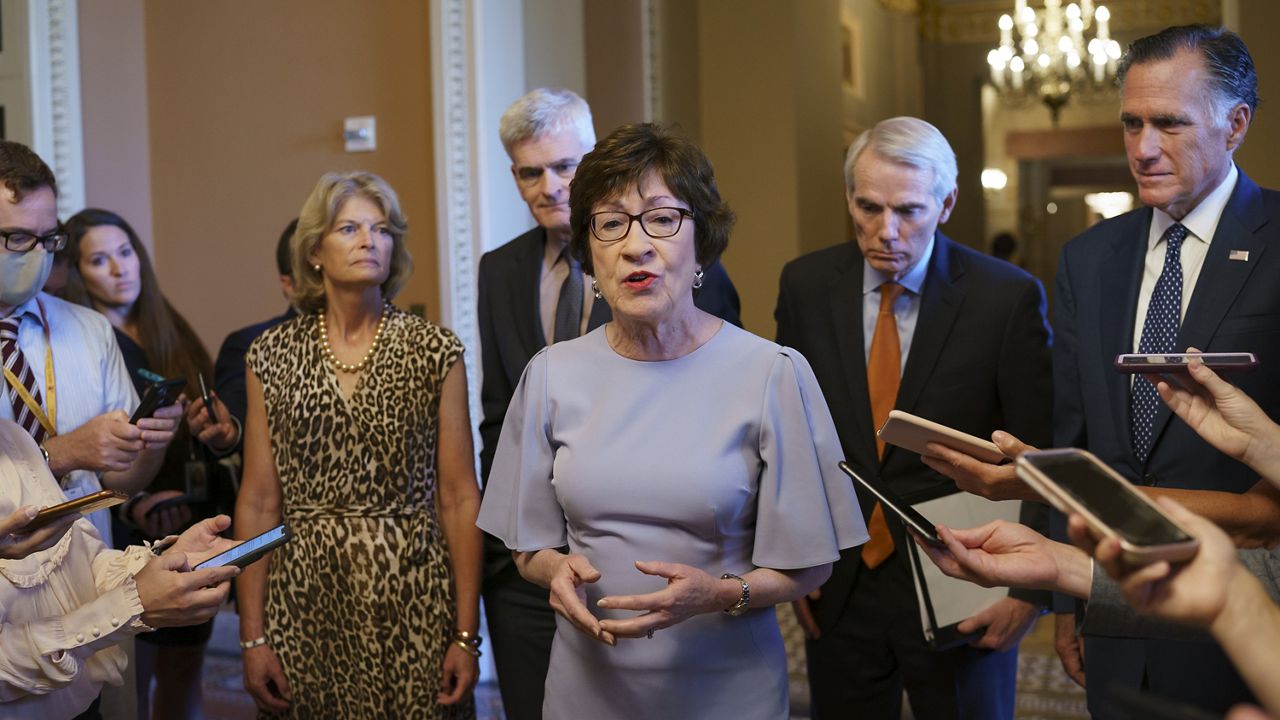After weeks of debate, negotiations, meetings and hours-long Zoom calls, Senators voted Wednesday night to begin debate on a nearly $1 trillion bipartisan infrastructure bill, a major part of President Joe Biden's economic agenda.
The final vote was 67-32, with 17 Republicans voting yes to advance the measure, including Sens. Roy Blunt, R-Mo., Kevin Cramer, R-N.D., Richard Burr, R-N.C., Bill Cassidy, R-La., Susan Collins, R-Maine, Lindsey Graham, R-S.C., Mitch McConnell, R-Ky., Thom Tillis, R-N.C., Chuck Grassley, R-Iowa, and John Hoeven, R-N.D.
Republicans who voted no included Sens. Joni Ernst, R-Iowa, John Thune, R-N.D., Rick Scott, R-Fla., Marco Rubio, R-Fla., John Barrasso, R-Wyo., and Tim Scott, R-S.C.
"My goal remains to pass both the bipartisan infrastructure bill and a budget resolution this work period. Both.," Senate Majority Leader Chuck Schumer, D-N.Y., pledged following the vote. "It might take some long nights, it might eat into our weekends, but we are going to get the job done. And we are on track."
The vote came hours after lawmakers announced that they had reached an agreement on the bill after weeks of disagreement over the specifics of the bill and how to pay for the measure, nearly leading to a total collapse.
"We now have an agreement on the major issues and we're prepared to move forward," Ohio Sen. Rob Portman, the lead Republican negotiator on the bill, told reporters earlier Wednesday.
Notably, Portman said that "this bill is paid for," a major sticking point between negotiators.
For days, senators and the White House had been working to salvage the bipartisan deal.
"I am pleased to join a bipartisan group of United States Senators and announce our deal to make the most significant long-term investment in our infrastructure and competitiveness in nearly a century," Biden said in a statement later Wednesday.
The measure would invest nearly $1 trillion in expanding broadband infrastructure, upgrading the country's roads, bridges, ports, rail and public transit and improving water infrastructure, including removing lead pipes. The deal includes $550 billion in new spending, according to the White House.
Per the White House the bill includes:
- $110 billion of new funds for roads, bridges, and major projects
- $11 billion in transportation safety programs
- $39 billion for public transit
- $66 billion for passenger and freight rail
- $7.5 billion to build out a national network of electric vehicle charges
- $2.5 billion in zero emission buses, $2.5 billion in low emission buses and $2.5 billion for ferries
- $17 billion in port infrastructure
- $25 billion for airports
- $55 billion for clean drinking water
- $65 billion for broadband infrastructure
- $73 billion for power and electrical grid infrastructure
"This deal signals to the world that our democracy can function, deliver, and do big things," Biden said after thanking the bipartisan group, Vice President Kamala Harris, members of his cabinet and other lawmakers. "As we did with the transcontinental railroad and the interstate highway, we will once again transform America and propel us into the future."
"This deal makes key investments to put people to work all across the country — in cities, small towns, rural communities, and across our coastlines and plains," Biden said.
After touting all of the things the bill will do, specifically noting job creation, Biden added that "we're going to do it without raising taxes by one cent on people making less than $400,000 a year — no gas tax increase and no fee on electric vehicles."
"We've got most of the text done," Arizona Sen. Kyrsten Sinema, a key mdoerate Democrat, said. "So we'll be releasing it, and then we'll update it as we get those last pieces finalized."
The bipartisan package includes about $600 billion in new spending on highways, bridges, transit, broadband, water systems and other public works projects.
"We're very excited to have a deal," Sen. Sinema added. "Everyone has been incredible and doing this work for many months."
Utah Sen. Mitt Romney said that this accord does "doesn’t mean every 't' is crossed, every 'i' dotted, but on the major issues we are there."
A vote to advance the measure will launch a potentially days-long process to consider the bill, and any possible amendments. Senators are bracing for a weekend session to work on the package.
The bill would also need to pass the House before it becomes law, where a razor-thin Democratic majority cannot spare more than a couple of defections.
House Democrats have their own transportation bill, which includes much more spending to address rail transit, electric vehicles and other strategies to counter climate change.
At a private meeting of House Democrats on Tuesday, Rep. Peter DeFazio of Oregon, the chairman of the House Transportation and Infrastructure Committee, called the Senate’s bipartisan measure "crap," according to two Democrats who attended the session.
House Speaker Nancy Pelosi did not commit to supporting the bipartisan package until she sees the details, but said Wednesday that she is “rooting for it.”
"I very much want it to pass," Pelosi added.
"Of course, neither side got everything they wanted in this deal," Biden said. "But that’s what it means to compromise and forge consensus — the heart of democracy. As the deal goes to the entire Senate, there is still plenty of work ahead to bring this home. There will be disagreements to resolve and more compromise to forge along the way."
"But the bottom line is — the Bipartisan Infrastructure Deal is a blue-collar blueprint to rebuild America that will help make our historic economic recovery a historic long-term boom," Biden concluded.
The Associated Press contributed to this report.



